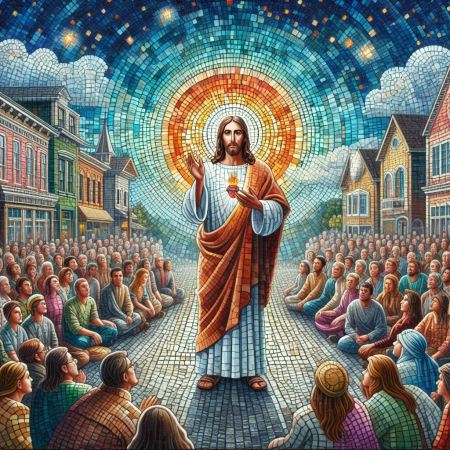6th Sunday of Easter
By Fr. Victor Feltes
Since Easter, we have been reading and reflecting on the post-resurrection appearances of Jesus and the apostles’ proclamation of the Gospel. Last Sunday we heard how the apostle Barnabas spoke on behalf of Paul and encouraged the other disciples to accept Paul’s conversion as genuine and welcome him into their community despite his past reputation. (Acts 11:19-26)
In the first reading today, St. Peter teaches us that God shows no partiality in His love. God loves everyone, both the Jews and the Gentiles. He wants everyone to be saved through His son Jesus. When Peter preached, the Roman army officer, a devout and kind man named Cornelius was the first non–Jew to become a believer in Jesus. According to Acts of the Apostles, Cornelius who was at prayer at about mid-afternoon had a vision. The Angel said to him that God was very pleased with all his prayers and kindness to the poor, (10:4) for his faithfulness God revealed His salvation to him.
At the same time, Peter had a vision, with various creatures in it. A voice from heaven told Peter to get up and eat. But Peter refused because his religious beliefs told him some of the animals were unclean. (10:14) The voice said to him not to call anything unclean that God has made clean. (11:15) While Peter was pondering over what he had seen, Cornelius arrived at his home. The Spirit encouraged Peter to go with the visitors to see Cornelius. Whatever the vision meant, Peter believed that God had a purpose; he understood God was removing barriers that were previously set in stone by his culture and religion. Through the conversion of Cornelius, the church began to embrace people from every nation and race. God used Cornelius, his family, and his friends to break down the barrier between them and the Gentles. The change did not come from a human plan but from God’s will and guidance.
The joy of the disciples, however, will be complete only if they love one another as Christ has loved them and if they continue to circulate to each other the love of Jesus that they have received. The love of Jesus for his disciples is the love of a friend. Friendship is mutual and manifests in love. Jesus manifests his love by laying down his life for his disciples. He wants us also to love each other as friends, willing to lay down our lives for each other. This is the Church—the community of Jesus’ friends. Our love must not be mere words or thoughts. When Mother Theresa of Calcutta was asked by journalists: ‘How can we solve the world’s problems?’ Her reply was simple: ‘Go home and love one another.’
We need to cultivate an abiding and loving friendship with Jesus. We need to express this love in our relationships with others by loving them and offering them trust, faithfulness, equality, forgiveness, joy, and sacrifice. We need to be persons for others: Jesus demonstrated the love of God, his Father, for us by living for us and dying for us. As Jesus’ disciples, we are to be persons for others, sacrificing our time, talents, and lives for others. The most effective way of communicating God’s love to others is by treating everyone as a friend.














